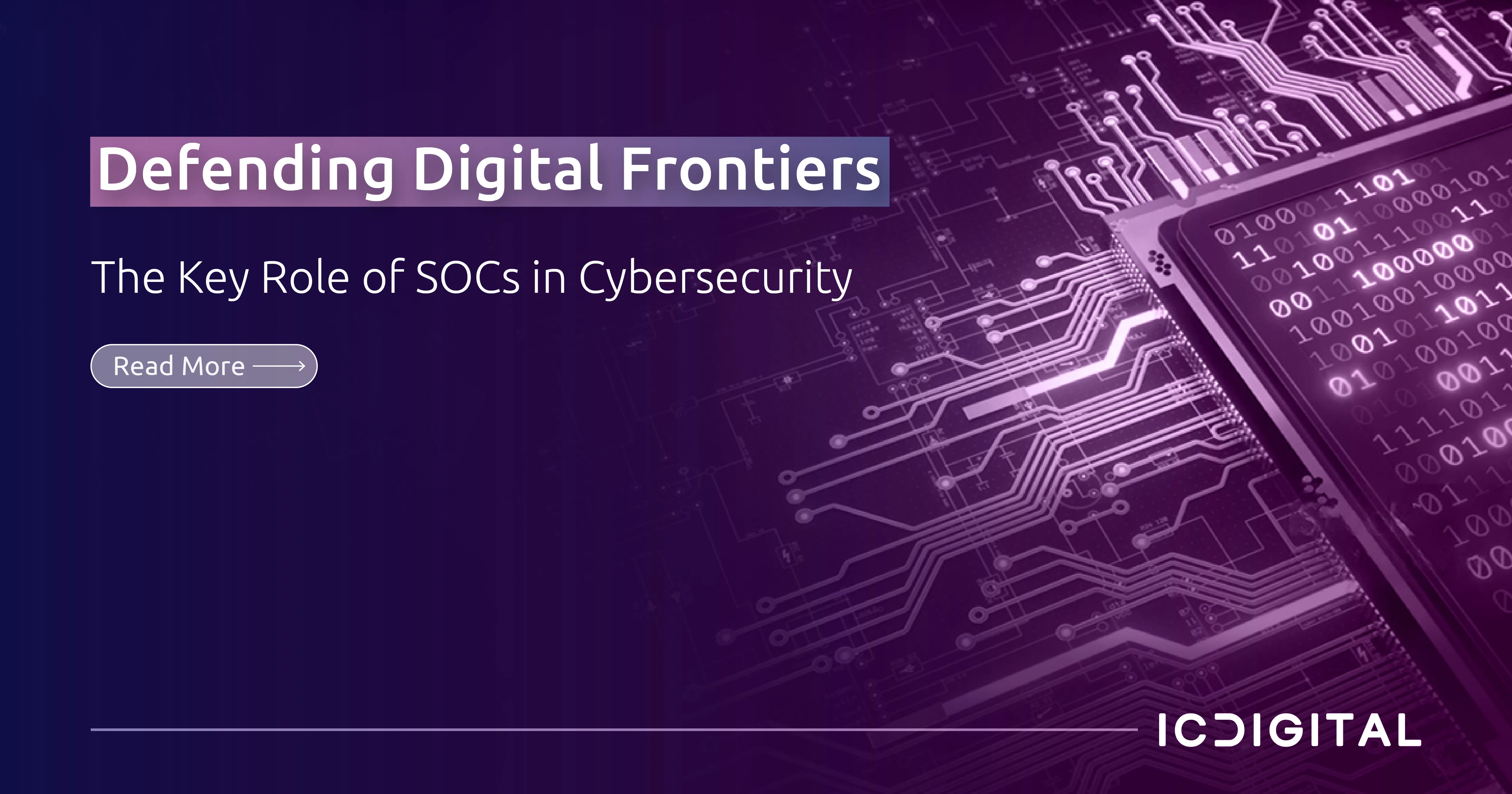
Defending Digital Frontiers: The Key Role of SOCs in Cybersecurity

Introduction:
In the rapidly evolving digital landscape, businesses are increasingly reliant on technology to streamline operations and enhance productivity. However, with the benefits of digitalization come significant risks, particularly in the form of cyber threats. As organizations continue to embrace technology, the need for robust cybersecurity measures becomes paramount. One key component in this defense against cyber threats is the Security Operations Center (SOC). In this blog post, we will delve into the crucial role of SOCs in safeguarding businesses and explore how they contribute to the overall cybersecurity framework.
The Growing Need for Cybersecurity Services:
With the escalating sophistication of cyber threats, businesses are recognizing the importance of investing in comprehensive cybersecurity services. Cybersecurity services encompass a range of measures designed to protect an organization's digital assets, sensitive information, and critical infrastructure. As businesses increasingly migrate their operations to digital platforms, the attack surface for cybercriminals widens, necessitating a proactive approach to cybersecurity.
Cloud Security Assessment Services:
One area of cybersecurity services gaining prominence is cloud security assessment. As organizations migrate their data and applications to the cloud, ensuring the security of these assets becomes paramount. Cloud security assessment services play a pivotal role in evaluating the security posture of cloud environments, identifying vulnerabilities, and implementing measures to mitigate risks. This proactive approach is essential for maintaining a secure cloud infrastructure and safeguarding against potential cyber threats.
Understanding the Role of Security Operations Centers (SOCs):
Security Operations Centers (SOCs) serve as the nerve center of an organization's cybersecurity efforts. A SOC is a centralized unit that monitors, detects, responds to, and mitigates cyber threats in real-time. It operates 24/7, continuously analyzing the organization's digital environment to identify anomalies and potential security incidents. The primary objective of a SOC is to proactively defend against cyber threats and minimize the impact of security incidents.
Key Functions of Security Operations Centers:
1. Continuous Monitoring:
SOCs employ advanced technologies and tools to continuously monitor the organization's network, endpoints, and cloud infrastructure. This proactive monitoring allows for the early detection of potential security threats, enabling a swift response to mitigate risks.
2. Incident Detection and Response:
When a potential security incident is identified, the SOC initiates a rapid response. This involves investigating the incident, determining the scope and impact, and implementing measures to contain and eradicate the threat. The ability to respond swiftly is crucial in minimizing the potential damage caused by cyberattacks.
3. Threat Intelligence Analysis:
SOCs leverage threat intelligence feeds to stay informed about the latest cyber threats and attack vectors. This information is crucial for understanding the evolving threat landscape and adapting security measures accordingly.
4. Vulnerability Management:
Identifying and addressing vulnerabilities in the organization's infrastructure is a key responsibility of SOCs. Regular vulnerability assessments and patch management are integral to maintaining a secure digital environment.
5. Collaboration with Other Security Components:
SOCs collaborate closely with other cybersecurity components, such as Incident Response Teams (IRTs) and IT teams, to ensure a coordinated and effective response to security incidents.
Empowering Business Through SOCs:
The presence of a well-functioning SOC empowers businesses to navigate the complex and dynamic cybersecurity landscape with confidence. By proactively monitoring and responding to potential threats, SOCs contribute to the resilience of an organization's digital infrastructure. This proactive approach is particularly vital as cyber threats continue to evolve, becoming more sophisticated and targeted.
The Role of SOCs in Cloud Security Assessment:
As businesses increasingly adopt cloud services, the role of SOCs extends to ensuring the security of cloud environments. Cloud security assessment services, when integrated with a SOC, provide a comprehensive approach to securing data and applications hosted in the cloud. SOCs play a vital role in monitoring cloud infrastructure, detecting unauthorized access, and responding to potential threats in real-time.
SOCs and the Human Element:
While advanced technologies are a cornerstone of SOC operations, the human element remains indispensable. Skilled cybersecurity professionals within the SOC analyze alerts, investigate incidents, and make critical decisions to safeguard the organization. Training and retaining skilled personnel are essential for the SOC to effectively fulfill its responsibilities.
Challenges and Opportunities in SOC Implementation:
Implementing and maintaining an effective SOC comes with its own set of challenges. Organizations must invest in the right technologies, regularly update their cybersecurity policies, and ensure that SOC personnel receive ongoing training to stay ahead of emerging threats. However, the benefits far outweigh the challenges, as a well-established SOC enhances an organization's overall cybersecurity posture and minimizes the risk of data breaches and other cyber incidents.
Conclusion:
In conclusion, the evolving threat landscape necessitates a proactive and comprehensive approach to cybersecurity. Security Operations Centers (SOCs) play a crucial role in this defense strategy, serving as the frontline defenders against cyber threats. As businesses embrace digital transformation and migrate to the cloud, the integration of cloud security assessment services within the SOC framework becomes imperative. By empowering businesses to detect, respond, and mitigate cyber threats in real-time, SOCs contribute significantly to the overall resilience and security of organizations in the digital age. As technology continues to advance, investing in the capabilities of SOCs remains a key priority for businesses looking to safeguard their digital assets and maintain the trust of their stakeholders in an increasingly interconnected world.
